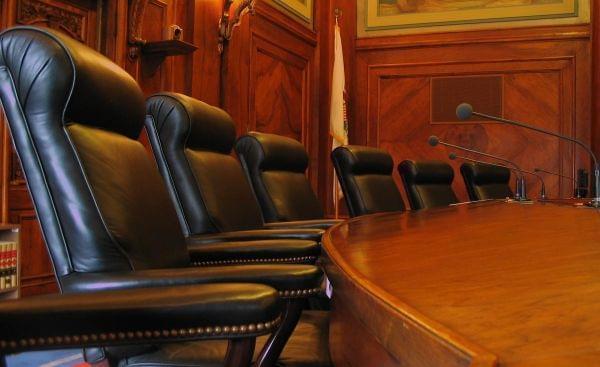Substitute Teacher For A Day Wants Bigger Pension Restored

The Illinois Supreme Court heard arguments on Tuesday, September 18 from a man who earned a state teacher pension after substitute teaching for one day. Credit Brian Mackey / NPR Illinois 91.9 WUIS
The Illinois Supreme Court heard arguments Tuesday from a man who earned a state teacher pension after substitute teaching -- for one day.
David Piccioli is a retired lobbyist for the Illinois Federation of Teachers. The one day he spent in the classroom back in 2007 nearly doubled his pension. Piccioli was able to do this by using newly-enacted legislation to purchase retroactive credit for his time as a union official.
That legislation, which was sent to then Gov. Rod Blagojevich in late December of 2006, only allowed a small portion of union employees to become certified and complete teaching service before the 2007 law took effect and become eligible to receive these benefits. While other union leaders were theoretically eligible, Piccioli is the only one who cashed in.
Piccioli paid roughly $190,000 to the Teachers Retirement System (TRS) to receive that back credit for his previous union service. According to court documents, Piccioli made these payments over the course of four years by borrowing from his annuity, selling stocks and bonds and also "scrimping and living a frugal lifestyle." The Chicago Tribune reported Piccioli, at one point, earned a salary of $206,000.
Years later, after the matter received attention in the press, legislators passed another law to strip Piccioli of most of the benefits. Piccioli was refunded the money he paid into TRS for the past credits. However, he says the Illinois Constitution does not allow the diminishment of state pensions.
"I obeyed all laws to join TRS," said Piccioli. "I paid all contributions. There's no cost to taxpayers, so there's no reason for this legislation taking away pension rights and I hope the court reaffirms that pensions cannot be diminished."
During oral arguments, Piccioli's attorney addressed the optics. Recognizing they did not look good, but also pointing out that Piccioli was not involved in lobbying for the 2007 act and had nothing to do with passing the bill.
"He was not in charge of lobbying pension issues, never lobbied pension issues," argued Esther Seitz, Piccioli's attorney. "In fact, the record is clear that he did not know that the union was involved in lobbying this bill until many years after it was enacted. But optics, especially when viewed through the rearview mirror, should not drive legal outcomes."
TRS argues the original 2007 law, allowing Piccioli to receive inflated benefits, was itself unconstitutional. Assistant Attorney General Richard Huszagh told the Supreme Court it was an attempt to give special privileges to Piccioli’s union.
“This came in at the end of the legislative term without much fanfare with a description that said this was a technical correction for a prior clean-up bill for early retirement legislation," he said. "So we have a special favors bill.”
A lower court upheld the clawback law in 2017. There's no timeline for when the Illinois Supreme Court might issue a decision. The case is Piccioli v. TRS, No. 122905.

